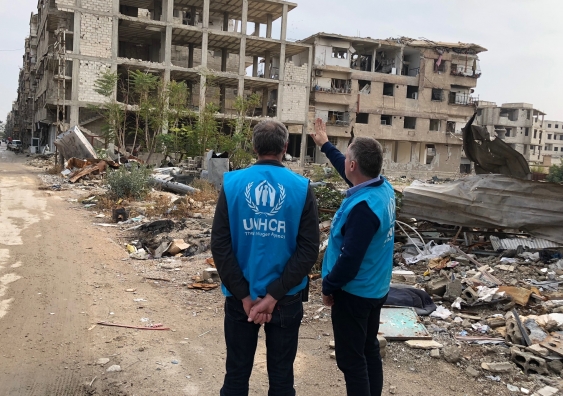Leading humanitarian and Head of Shelter and Settlements at the United Nations High Commissioner for Refugees (UNHCR) in Geneva Brett Moore will present at the Annual Judith Neilson Lecture at UNSW on 27 August.
In the Lecture – the final UNSW Utzon Lecture of 2019 – Moore will share what role Australian built environment professionals can play in responding to the global humanitarian displacement of refugees and specifically the challenges faced by urban refugees.
“People assume that most refugees live in camps however most live in urban areas, in cities and towns across the world and we need a discussion about how to respond to their challenges of forced displacement in an urban environment,” Moore says.
“I’ll be discussing the current refugee and internally displaced people (IDP) situation using examples from Syria, Bangladesh and Uganda and what role Australian built environment professionals can play in resolving these global issues.
“My advice is particularly for Australian built environment professionals to have an awareness of international issues and what other professions and disciplines can be drawn on to better understand these complex issues.”
Humanitarian journey
For the past 19 years, Moore’s career has been driven by issues of social justice, equity and sustainability of the built environment spanning more than 20 countries, particularly recovery efforts in post-disaster and post-conflict areas.
Moore is now UNHCR’s Head of Shelter and Settlements, an organisation created in 1950 to provide legal protection and humanitarian assistance to refugees, internally displaced people, asylum seekers and those requiring shelter in times of crisis. There he leads a team which focuses on supporting refugees and internally displaced people across the globe, including managing the global shelter programme covering operations in 46 countries with 180 employees and a smaller team of 11 in Geneva.
He also co-leads the Global Shelter Cluster, a collective of humanitarian agencies that undertake emergency shelter responses.
Before joining UNHCR, he was the Head of Shelter and Infrastructure for World Vision International where he was deployed to Nepal, Somalia, Vanuatu and the Philippines to lead the implementation of shelter programmes immediately following major disasters.
“The most memorable experience of my career was the tsunami relief work that I did in Sri Lanka after the 2004 tsunami. I worked for World Vision in Jaffna and then for the United Nations Office for Project Services (UNOPS) where I ran a sub-office in Kilinochchi assisting with reconstruction of schools, clinics, hospitals, and housing, working with affected local community and internally displaced people,” he says.
“I was the only foreigner in the office with around 60 national staff working as part of UNOPS, providing families with immediate assistance, coordinating international aid in the area and taking part in one of the biggest civil recovery operations the world had seen for decades."
Before his appointment to UNHCR, Moore spent a year at Harvard as a prestigious Loeb Fellow, which involved engagement, teaching, research and writing on humanitarian and built-environment issues.
He completed a Bachelor of Architecture at the University of Melbourne but says he was always interested in issues of social justice, equity, urbanisation and sustainability. His first career step in this direction was taking part in the Australian Agency for International Development’s (AusAID’s) Australian Youth Ambassadors for Development (AYAD) programme in Hanoi, Vietnam in 2001, cementing his interest in blending the architectural profession with humanitarian work and overseas aid programs.
“It’s important for built environment professionals, industry leaders or students to think of themselves as operating on a global level rather than what skills can be applied only to their role in NSW or Australia,” he says.
“Australian graduates have a lot to offer and are sensitive to humanitarian and development needs outside of conventional career pathways. I would encourage them to see themselves as global citizens and be prepared to work with openness and curiosity.”
While in Sydney to speak at the Judith Nielson lecture, Moore will also be announcing the winners of the Cities and Refugees Global Student Design Ideas Competition, hosted by the Rapid Urbanisation Grand Challenge at UNSW. The winning entries will be revealed at the APRU Sustainable Cities and Landscapes Conference on 29 August.
UNSW Built Environment's UTZON Lecture Series features industry experts and academics whose inspiring work shapes the world's future cities for the benefit of all people and the planet.
Register for the lecture.


